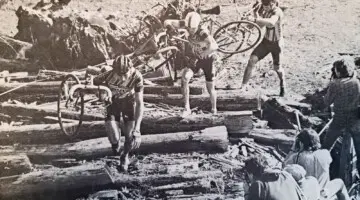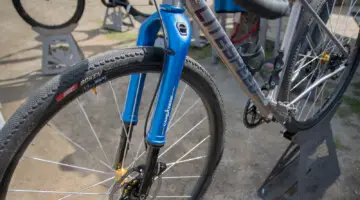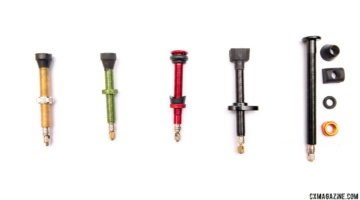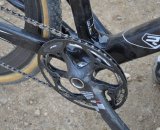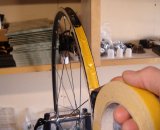
Knowing how to act in the Pits is as important as knowing how to get that bike ready to roll in 4 minutes. © Daimeon Shanks
Daimeon Shanks, pro mechanic and co-owner of The Service Course repair shop in Boulder, Colorado, shares his wisdom this week on how to survive, and thrive, in the cyclocross pits. Missed the last article on chainrings? Go back and check it out. Now that you’re licking your – and your bike’s –wounds from this past weekend, prepare for the races ahead with a pro setup that’s sure to see you through to glory.
by Daimeon Shanks
Pit Etiquette
The pits during a cyclocross race can be hectic, confusing, boring, stressful, dangerous, and practically any other condition that you can think of. Most seasoned pro wrenches have their pit routine down to an art so that they’re never caught off guard, no matter what their riders might throw at ’em. While none of us are perfect (even Sven Nys’ mechanics miss a bike exchange sometimes), there are a couple of hard and fast rules that everyone adheres to.
How do you get to be a pit pro? The best teacher has always been experience; many of the best lessons can only be learned by making a costly mistake. So if you’re being recruited to work the pits for the first time, it can be a scary and stressful proposition. Here’s my advice on how to be a competent newbie in the pits:
Be Prepared
Being ready in the pits begins way before the race does. During my years on the pro circuit, I’ve only really had one hard and fast rule: don’t ever leave for tomorrow what can be done today.
Make sure your rider’s bikes are prepped and completely race-ready the day before. Don’t leave any mechanical work for the morning of the race, something will ALWAYS go wrong. Trust me, I know.
Get your pit gear sorted the day before, as well. Know what tools you’ll need to bring, what kind of clothes you’ll need for the weather conditions, and any extra things you’ll want such as food, water, sunblock, camera, etc…
Before the race starts, walk over and check out the pits. Figure out where you’ll want to be in the pits and let your rider know where you’ll be situated. Check out the wash situation – if there aren’t enough hoses or pressure washers for everyone, you might be better off bringing your own bucket of water and a brush with you. Better to figure this stuff out two hours before the start, not when the starting gun goes off.
Be Organized
Organization is the key to efficiency. Have your pit equipment laid out in an organized manner and you’ll always know where to find what you need when you need it.
I keep my pit bag [read Daimeon’s advice on pit bags here] strapped to the fence next to my spare wheels. I keep at least one rag draped over the fence next to my bag, and lubes on the ground next to my wheels. When you might have to do a bike wash, lube, and exchange every 4 minutes of a race, the last thing you want to do is spend 45 seconds searching for WD40.
Keep Your Head on a Swivel
Cyclocross pits, especially when the weather is bad, can be one of the most hectic environments you ever find yourself in. Racers are flying by on both sides, mechanics are running from one end to the other getting the bikes washed each lap, and the officials are usually just in the way.
Be EXTREMELY aware of what’s going on around you. If you see two mechanics lined up to do a bike exchange, that’s a good bet that there’s an anxious rider barreling into the pits to meet them. Pretty much the worst mistake you can make is crashing another mechanic’s rider. It’s an unforgivable faux pas. If you’re moving up and down the pit, constantly check over your shoulder for anyone (or anything) that might be coming your way.
It’s important to not get too caught up in the race, i.e. being a superfan. Pay attention to your rider and the mechanics around you. Dusty Labarr, mechanic for the Kona cyclocross team, elegantly put it this way: “you’re not there to be a %&$ing fan, you’re there to do your %&^ing job.”
Be Considerate
Yeah, yeah, we know your rider got a top 30 at the last Bay City series, despite having a family, full time job, a prosthetic toe, and SARS…doesn’t mean you get to be a dick. Cyclocross is a small scene and you’ll be seeing the same people every weekend.
There’s always room for everyone, no matter how crowded the pit is. Don’t stand in the middle of the lane while the leaders are coming through if you know your rider is in 20th place. When your guy comes into sight, step up and prepare for an exchange. As soon as they go by, clear away to the opposite side and make room for the next mechanic stepping up. It helps if you position yourself away from other pit crews that will have riders racing near the same level as your rider.
Help your colleagues if they need it, ‘cause I can guarantee you at some point, you’ll be the one needing help. UCI rules dictate that every rider can have only one mechanic in the pit, so it can be difficult to find someone to catch on a bike exchange.
Make friends. Of all the mechanics I know, the vast majority of them are friendly, outgoing, and more than happy to pass along advice and offer assistance. Just as long as you’re buying the beers later.
Practice
If you’ve never done a bike exchange before, practice it with your rider before the race! A bad exchange may slow the rider a little bit, but a REALLY bad exchange can end a rider’s season. While it’s not overly difficult, bike exchanges get easier as you do more of them. Have a technique ready for catching the bike, too – if you can’t get someone to catch for you, you might have to catch and exchange by yourself. If this isn’t something you’re comfortable with, it’s perfectly okay to let the rider drop their bike before grabbing their new one – just let everyone around you know what’s going on so they don’t get smashed by a wayward Redline.
Learn the rules that apply to cyclocross. As a mechanic, it’s your job to help inform your rider of what’s legal and what’s not. If they come into the pit and for some reason they don’t have a bike ready, make sure they know they have to put a foot down or risk disqualification. Check that their tires are not over 33mm before the race begins. If a rider gets a mechanical on course, they can’t go backwards on course and get to the pits…they have to keep moving forward.
Practice washing the bike, too. Get fast and efficient at cleaning the parts that matter, namely the drivetrain, wheels, and cockpit. Be aware that others are waiting behind you to wash their bikes so being done in a timely manner is important for everyone.
Have Fun
Working in the pits can be stressful, challenging, hard, and demoralizing, but at the end of the day, it’s just bike racing! It’s important to keep that in the back of your mind when the conditions get tough. If you’re not having fun then you’re definitely doing something wrong.









